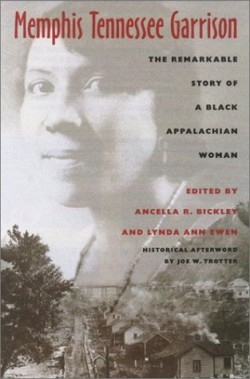Memphis Tennessee Garrison
The Remarkable Story of a Black Appalachian Woman
Memphis Tennessee Garrison was a schoolteacher and prominent early figure in the National Association for the Advancement of Colored People (NAACP). Bickley lets Garrison tell her story, offering a new view of Appalachia. “What has traditionally been presented as ‘Appalachian’ is a pervasive image of agriculturally based rural people who create quilts, crafts, and country music, most growing out of European-derived customs,” note the editors. Little known outside the coal-mining “hollers” of West Virginia, Garrison’s story is the history of the black people of the region.
Starting with a recently discovered oral history recorded by Garrison more than 30 years ago, Bickley, an educator who introduced the first Black Literature class at West Virginia State University, presents several chapters of additional information, then proceeds with Garrison’s account of her life. Garrison, born in 1890 the daughter and granddaughter of slaves, got her name because her red-headed mulatto aunt was one of the first teachers in that city. “After being there awhile she came home and there was a little baby that didn’t have a name.” In her own words Garrison relates her family history, including her memory of the scars on her grandfather’s back: “The welts on Granddaddy’s back were like your finger-ridges, crisscrossed just as that whip struck.”
Bickley’s theory is that Garrison, and women like her, laid the foundation for the civil rights achievements of the 1960s. She served as a conduit between the upper management of U.S. Steel in her hometown of Gary, West Virginia and the coal miners, largely black and immigrant. Garrison spear-headed the Negro Artists’ Series in the 1920s and brought black performers to the area; she paid for hot breakfasts for school children out of her own pocket; she became politically active on local, state, and national levels. She was a vice-president of the NAACP board of directors in the early 1960s and a member of President Lyndon Johnson’s 1964 National Citizens Committee on Community Relations.
Garrison died in 1988 at age 98. Her story sheds light on a time and a place outside mainstream American consciousness. A former first-grade student later recalled: “In the twenties we had no voice. Mrs. Garrison was our spokesperson. She was a pioneer for our rights.”
Reviewed by
Robin Farrell Edmunds
Disclosure: This article is not an endorsement, but a review. The publisher of this book provided free copies of the book to have their book reviewed by a professional reviewer. No fee was paid by the publisher for this review. Foreword Reviews only recommends books that we love. Foreword Magazine, Inc. is disclosing this in accordance with the Federal Trade Commission’s 16 CFR, Part 255.

